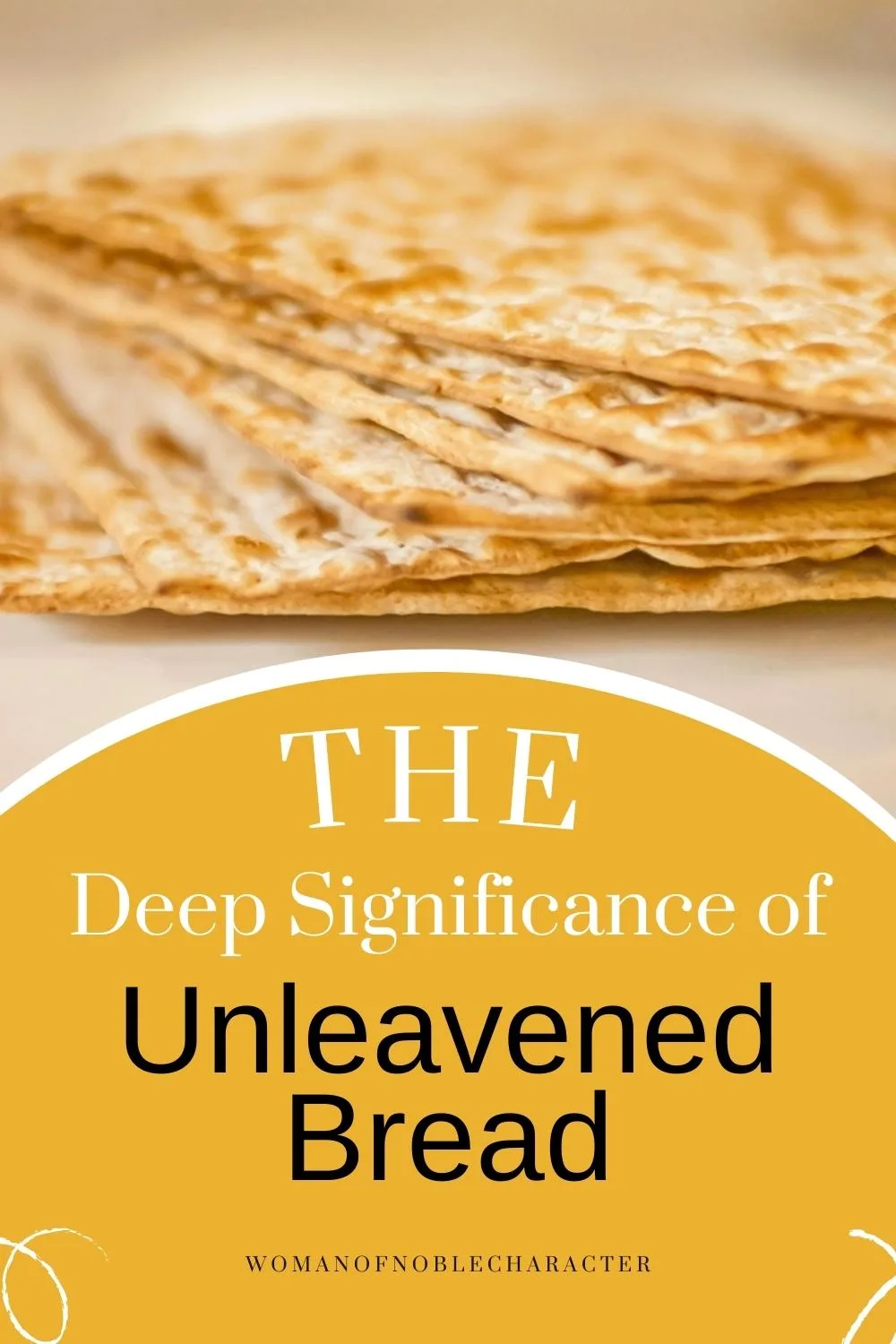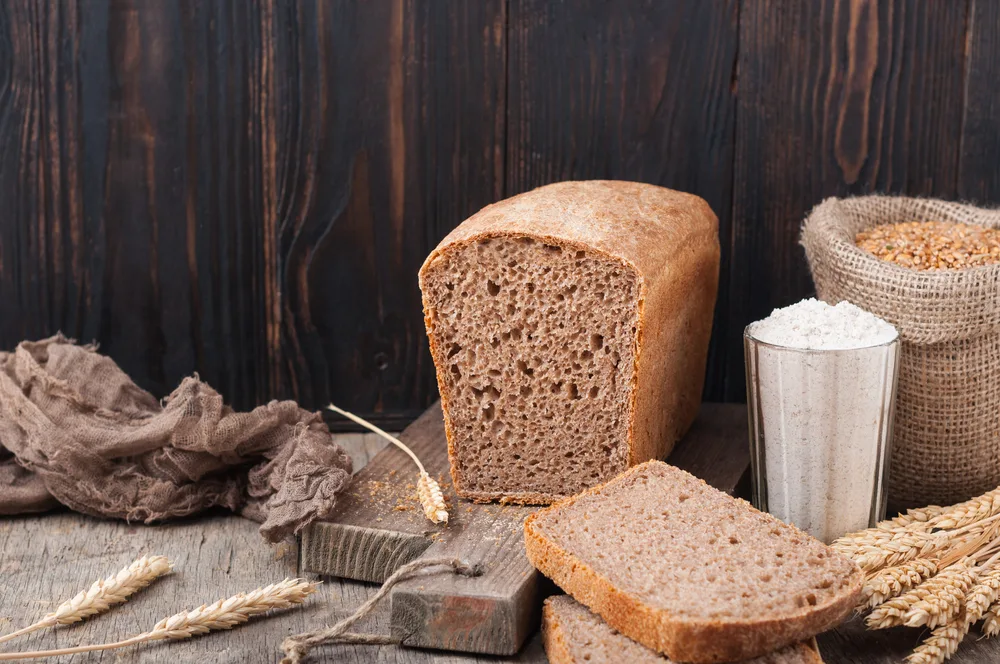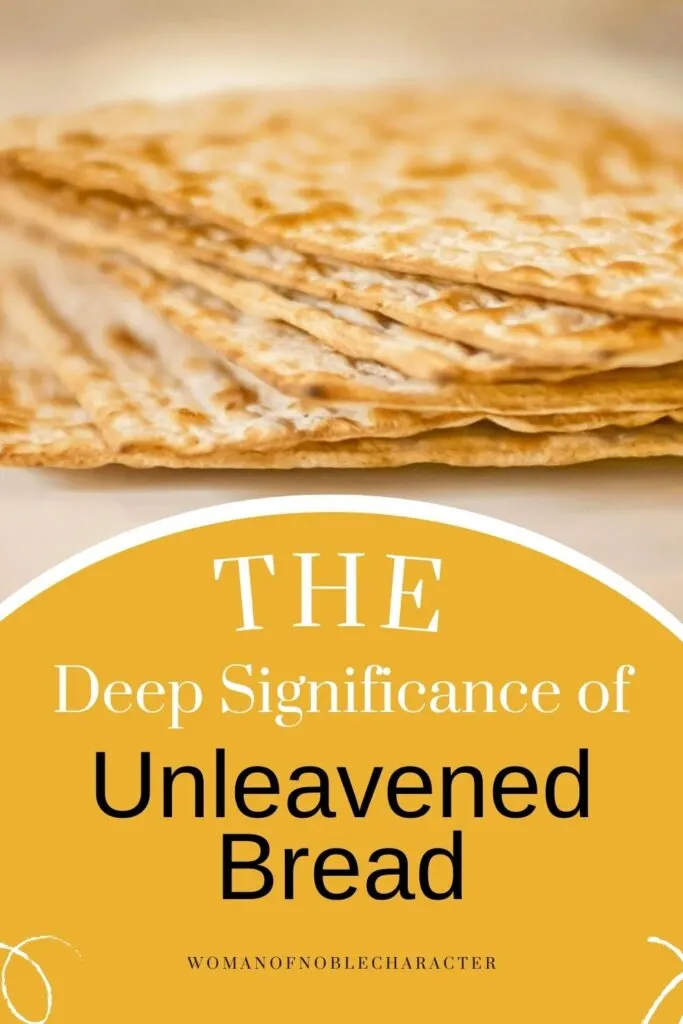This page/post may contain affiliate links. As an Amazon Associate, as well as an affiliate of other programs, this means if you purchase something using these links, I will receive a commission on qualifying purchases at no cost to you! For more detailed information, please visit our Affiliate Disclaimer page
Unleavened bread is mentioned in both the Old and New Testaments. It is of paramount importance to first understand the difference between leavened and unleavened bread in general before we delve into this very interesting topic of unleavened bread in the Bible from a Christian and spiritual point of view.
At the end of this topic, we should be able to understand how history’s most glorious moment that happened to the children of Israel in the Old Testament is still of relevance in our modern-day Christian lives.

What is Leaven?
Most types of bread, cookies, and crackers list ‘leaven’ (in one of its forms) as an ingredient. Leaven, also known as yeast, is what makes the dough rise hence an important ingredient most bakers will rather not ignore. Having said that, though, there are many different types of unleavened bread made across the globe. Some popular examples include roti, chapati, and matzo, to name but a few.
Unleavened breads are commonly eaten during religious annual festivals and many other feasts of the Lord. A lot of people today will be more familiar with the celebration of the Passover and Easter as they resemble and emphasize the death and resurrection of Christ.
Leaven is a common household product that most people even consume daily. So, what spiritual lesson can we draw or learn from this amazing bread rise that the whole assembly of the congregation of Israel was commanded to remove from their houses?
The form you have selected does not exist.
Festival of unleavened bread
Partaking in the eating of unleavened bread was and remains a symbol of God’s everlasting mercy and deliverance unto the people of Israel. The Bible teaches us about the history of the ancient nation as God’s chosen people.
The sons of Israel had always hoped for a deliverer to free them from hundreds of years that they suffered in slavery and bondage at the hands of Pharaoh the king of Egypt. At the appointed time, God’s promise of freedom and their departure to the promised land was fulfilled but not before a series of plagues, including the death of the firstborn of Egypt, Pharaoh ordered them to leave.
They left by night in haste, taking bread dough, but with no time to allow it to become leavened.
‘And the Egyptians were urgent upon the people, that they might send them out of the land in haste; for they said, We be all dead men. And the people took their dough before it was leavened, their kneading troughs being bound up in their clothes upon their shoulders. And the children of Israel did according to the word of Moses; and they borrowed of the Egyptians jewels of silver, and jewels of gold, and raiment: and the LORD gave the people favor in the sight of the Egyptians, so that they lent unto them such things as they required. And they spoiled the Egyptians’.
Exodus 12:33-36 KJV
After they left, God’s command was for them to have The Festival of Unleavened Bread. It was deeply important, something it reminded the Hebrews of their past and foreshadowed what was to come in future years. They were to eat only unleavened bread every year during the feast of Passover as a commemoration of freedom from Egyptian slavery and bondage. The first mention of the Feast of Unleavened Bread is in Exodus.
“Seven days shall ye eat unleavened bread; even the first day ye shall put away leaven out of your houses: for whosoever eateth leavened bread from the first day until the seventh day, that soul shall be cut off from Israel.
And in the first day, there shall be a holy convocation, and in the seventh day there shall be a holy convocation to you; no manner of work shall be done in them, save that which every man must eat, that only may be done of you.
And ye shall observe the feast of unleavened bread; for in this selfsame day have I brought your armies out of the land of Egypt: therefore shall ye observe this day in your generations by an ordinance for ever.”
Exodus 12:15-17 KJV
There are other references to the feast in other books of the Bible, including Deuteronomy.
“You shall not eat leavened bread with it; instead, for seven days you shall eat the Passover with unleavened bread, the bread of affliction (for you left the land of Egypt in haste); [do this] so that all the days of your life you may remember [thoughtfully] the day when you came out of the land of Egypt.”
Deuteronomy 16:3 AMP
It is from these verses that we can safely conclude that leaven gives a picture of sin, as the departure of the Israelites from Egypt is symbolic of an individual leaving the slavery of a sinful life.
Unleavened bread in the New Testament
In the New Testament, leaven represents wickedness. Jesus used an example to teach about the symbolism of leaven.
“Then Jesus said to them, “Take heed and beware of the leaven of the Pharisees and the Sadducees.”
Matthew 16:6 NKJV
“Why can’t you understand that I’m not talking about bread? So again I say, ‘Beware of the yeast of the Pharisees and Sadducees.’”
Matthew 16:11-12 NLT
Then at last they understood that he wasn’t speaking about the yeast in bread, but about the deceptive teaching of the Pharisees and Sadducees.”
The Pharisees’ and Sadducees’ teaching, malice, and lying was the sin that had filled their culture, and Jesus was there to eradicate them by bringing the Good News.
The Passover sacrifice
The Passover lamb is the sacrifice that the Israelites ritually slaughter on the evening of the first day of the unleavened bread (Passover), and eat on the first night of the holiday with bitter herbs and matzo (a type of cracker-like unleavened bread). It is believed to have been first offered on the night of the Exodus from Egypt, according to the Torah.
God ordered the Israelites to paint their doorposts with the blood of this sacrifice as a sign to Him that when passing through the land to slay the firstborn of the Egyptians, He should pass by the houses of the Israelites.
In the New Testament, our Lord Jesus Christ is indeed our sacrificial lamb that brought about salvation, deliverance, reconciliation with God, and eternal life.
The Son of God boldly made a declaration in the early passages of John chapter 6
“Jesus replied, “I am the bread of life. Whoever comes to me will never be hungry again. Whoever believes in me will never be thirsty.”
John 6:35 KJV
Indeed Christ was our Passover sacrifice, and no doubt He, too, observed the days of the Festival of the Lord’s Passover as recorded in the same chapter. Interestingly enough, He boldly referred to Himself as being the ‘living bread’ in John 6:51, the bread from heaven, the giver of bread, and the one who will resurrect on the last day those who believe in and partake of Him (John 6:32-34)
Jesus is the true Bread of Life. His pure and spotless resurrected life lives inside every Believer through His Holy Spirit. His blood cleanses us from sin, and His Spirit sanctifies us until the day of His return. (Philippians 1:6). Jesus is not only the Bread, but He is also the fulfillment of the ancient Jewish feast.
Passover meal
The Last Supper, which is widely known in the New Testament, was a Passover Seder meal that Jesus Christ and His disciples ate to celebrate this event. It is on this occasion that the Messiah taught His disciples that the wine and the bread at the meal signified that he will become a sacrificial lamb by which sins are forgiven, marking the beginning of a new covenant between the most High God and men so reconciliation with Him can occur.
And when He had taken bread and given thanks, He broke it and gave it to them, saying, “This is My body which is given for you; do this in remembrance of Me.”
Luke 22:19 AMP
Since then, breaking bread and drinking holy wine as part of Holy Communion has been a regular occurrence in modern-day Christian assemblies, as Christ Himself told his disciples always to do this in remembrance of Him. It’s an essential role in the worship life of every Believer.
When eating this bread, ‘we proclaim the Lord’s death until he comes’ and accept upon ourselves the yoke of the cross.
“For as often as you eat this bread and drink the cup, you proclaim the Lord’s death until he comes.”
1 Corinthians 11:26 ESV.
However, the partaking of communion is not to be taken hastily as Apostle Paul warns the believers not to partake lightly or in an unworthy manner, for in doing so, he says, we would be eating and drinking judgment on ourselves,
“For anyone who eats and drinks [without solemn reverence and heartfelt gratitude for the sacrifice of Christ], eats and drinks a judgment on himself if he does not [a]recognize the body [of Christ].”
1 Corinthians 11:29 AMP
Not having a good relationship with the Lord, yet partaking in this practice, means we would not be sharing Christ’s affliction, but rather adding affliction to ourselves. Therefore, self-examination and repentance are required before doing so.
Scripture commonly uses leaven or yeast as a symbol of sin. Apostle Paul reminded members of the early church of something significant about the symbol of sin or rather the leaven of sin in this context by pinpointing that principle. We can’t ignore the way sin spreads like leaven in a loaf of bread.
“Your glorying is not good. Know ye not that a little leaven leaveneth the whole lump?
1 Corinthians 5:6-8 KJV
Purge out therefore the old leaven, that ye may be a new lump, as ye are unleavened. For even Christ our passover is sacrificed for us:
Therefore let us keep the feast, not with old leaven, neither with the leaven of malice and wickedness; but with the unleavened bread of sincerity and truth.”
“A little yeast works through the whole batch of dough”
Galatians 5:9 NIV
Just like that, a little sin is still as harmful and dangerous to a Christian’s lifestyle no matter how devoted one can be. A little sin can quickly contaminate a marriage, family, church, or nation until everything it touches is cursed with death. We must bear in mind that a little yeast is still a leavening agent, even for the whole batch of dough.
That’s why God calls us to a life of holiness.
“Say to all the congregation of the children of Israel, ‘You shall be holy, for I the Lord your God am holy.
Leviticus 19:2 AMP
In this verse, the Lord emphasizes being holy. The word for holy in Hebrew is ‘qadash’, which means to be sanctified, consecrated, and dedicated or to be separated from the world and worldliness. Each of these specific practices helped remind the Israelites to separate themselves from this world and its ungodly practices.
“But God be thanked, that ye were the servants of sin, but ye have obeyed from the heart that form of doctrine which was delivered you.
Romans 6:17-18 KJV
Being then made free from sin, ye became the servants of righteousness.”
Removing leavened food from our lives for one week and stopping regular work on the first and final day of the Holy Week reminds us to keep sin out of our lives. Eating unleavened bread teaches us to put the righteousness of the living Father into our lives.

Unleavened Bread and the Modern-day Christian
Today, Jewish people still celebrate Passover as one of Israel’s seven annual festivals and observe all the scriptural obligations. The feast begins at twilight on a Sabbath day and ends seven days later on another Sabbath day. These Sabbaths are not the same as the weekly Sabbath but are considered high holy days.
The day after the Passover meal, a second festival begins called the Feast of Unleavened Bread or Chag HaMatzot —which lasts for seven days. Many see these two celebrations as one long eight-day festival.
During the entire week that Jewish families celebrate the Feast of Unleavened Bread, they remove all leaven from their homes and eat only yeast-free bread called Matzah. The baking process stripes and pierces this flat, baked bread—just as Jesus was pierced and striped for our iniquities (Isaiah 53:5).
Now that we realize that the Feast of Unleavened Bread played an important role in the early church and Christ’s death, it should be every believer’s sole goal to live a pleasing and righteous life by repenting, being saved, obeying God and connecting with Him daily. The Holy Spirit is our guide and teacher in this life.
Discipline, commitment, and righteousness were necessary and important to an ancient Israelite during the days of unleavened bread in the Old Testament. How much more in these days of the new covenant that we entered with our Lord Jesus Christ, who redeemed us from the power and the jaws of the evil one?
It is in this confidence and hope that we have in the Risen Christ that we continue strongly in this race of salvation that was run by those who were before us. All who walked in faith, as listed in Hebrews 11, and all the practices in the Bible, such as the Feast of Unleavened Bread, are a lesson and example to teach, encourage and inspire us to live in faith too.
“Therefore we also, since we are surrounded by so great a cloud of witnesses, let us lay aside every weight, and the sin which so easily ensnares us, and let us run with endurance the race that is set before us,looking unto Jesus, the author and finisher of our faith, who for the joy that was set before Him endured the cross, despising the shame, and has sat down at the right hand of the throne of God.”
Hebrews 12:1-2 NKJV
We can add depth and dimension to our worship by recognizing God’s unfolding plan that begins with a sacrificial Passover lamb and is fulfilled with The Lamb of God, who takes away the world’s sins.
What does unleavened bread in the Bible symbolize? Check out the video below.
You may also enjoy one of my favorite resources below:
Sherrie’s Favorite Unleavened Recipes: For Passover and The Days of Unleavened Bread by Sherrie Giddens
Home Prayers for the Festival of Unleavened Bread: A Schedule of Prayers for the Morning, Afternoon and Evening during the Seven Days of the Festival of Unleavened Bread by Shmuel ben Naftali
The Passover & Unleavened Bread Activity Book by Bible Pathway Adventures Pip Reid
NKJV – Scripture taken from the New King James Version®. Copyright © 1982 by Thomas Nelson. Used by permission. All rights reserved.
NLT – Holy Bible: New Living Translation. 1994, 2004, 2007, 2013. Carol Stream, IL: Tyndale House Publishers
ESV – “Scripture quotations are from The ESV® Bible (The Holy Bible, English Standard Version®), copyright © 2001 by Crossway, a publishing ministry of Good News Publishers. Used by permission. All rights reserved.”

